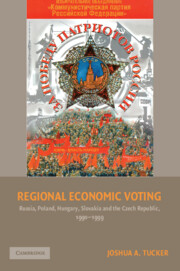Book contents
- Frontmatter
- Contents
- List of Tables
- Acknowledgments
- Party Acronyms and Candidate Abbreviations
- 1 INTRODUCTION
- 2 ECONOMIC CONDITIONS AND ELECTION RESULTS
- 3 COMPARATIVE CROSS-REGIONAL ANALYSIS
- 4 PAIRED CASE STUDIES
- 5 THE INCUMBENCY HYPOTHESIS
- 6 THE NEW REGIME HYPOTHESIS
- 7 THE OLD REGIME HYPOTHESIS
- 8 COMPARATIVE ANALYSIS
- 9 ECONOMIC VOTING AND POSTCOMMUNIST POLITICS
- Appendix I NATIONAL ELECTION RESULTS
- Appendix II REGRESSION RESULTS AND DOCUMENTATION
- Appendix III ESTIMATED DISTRIBUTIONS OF FIRST DIFFERENCES
- Appendix IV PERCENTAGE OF POSITIVE SIMULATIONS BY PARTY
- Works Cited
- Index
- Titles in the series
5 - THE INCUMBENCY HYPOTHESIS
Published online by Cambridge University Press: 24 November 2009
- Frontmatter
- Contents
- List of Tables
- Acknowledgments
- Party Acronyms and Candidate Abbreviations
- 1 INTRODUCTION
- 2 ECONOMIC CONDITIONS AND ELECTION RESULTS
- 3 COMPARATIVE CROSS-REGIONAL ANALYSIS
- 4 PAIRED CASE STUDIES
- 5 THE INCUMBENCY HYPOTHESIS
- 6 THE NEW REGIME HYPOTHESIS
- 7 THE OLD REGIME HYPOTHESIS
- 8 COMPARATIVE ANALYSIS
- 9 ECONOMIC VOTING AND POSTCOMMUNIST POLITICS
- Appendix I NATIONAL ELECTION RESULTS
- Appendix II REGRESSION RESULTS AND DOCUMENTATION
- Appendix III ESTIMATED DISTRIBUTIONS OF FIRST DIFFERENCES
- Appendix IV PERCENTAGE OF POSITIVE SIMULATIONS BY PARTY
- Works Cited
- Index
- Titles in the series
Summary
The Incumbency hypothesis predicts that incumbent parties should enjoy greater electoral success in regions of the country where the economy is performing better than in regions of the country where the economy is performing worse. Of the three standard economic voting hypotheses tested in the book, the empirical support for the Incumbency hypothesis is the weakest. This is not to say that there is no support for the hypothesis, but of the forty-nine incumbent parties that contested the twenty elections examined in this book, we are only confident that economic conditions had the expected effect on the vote for twenty of these parties; in other words, the hypothesis is strongly supported by the data in only slightly more than 40% of the cases.
With over half of the cases considered in the study failing to provide support for the Incumbency hypothesis, turning to the conditional economic voting hypotheses to try to provide an explanation for the variation in support for this hypothesis is particularly instructive. In terms of the intuitive conditional hypotheses, neither the East-Central Europe versus Russia nor the Presidential versus Parliamentary distinctions provide much leverage in explaining the variation in empirical support for the Incumbency hypothesis. However, I do find modest levels of support for some of the more theoretically oriented conditional hypotheses. In particular, I find stronger empirical support for the Incumbency hypothesis as the decade progresses and among parties that received a larger percentage of the overall national vote.
- Type
- Chapter
- Information
- Regional Economic VotingRussia, Poland, Hungary, Slovakia, and the Czech Republic, 1990–1999, pp. 152 - 183Publisher: Cambridge University PressPrint publication year: 2006



